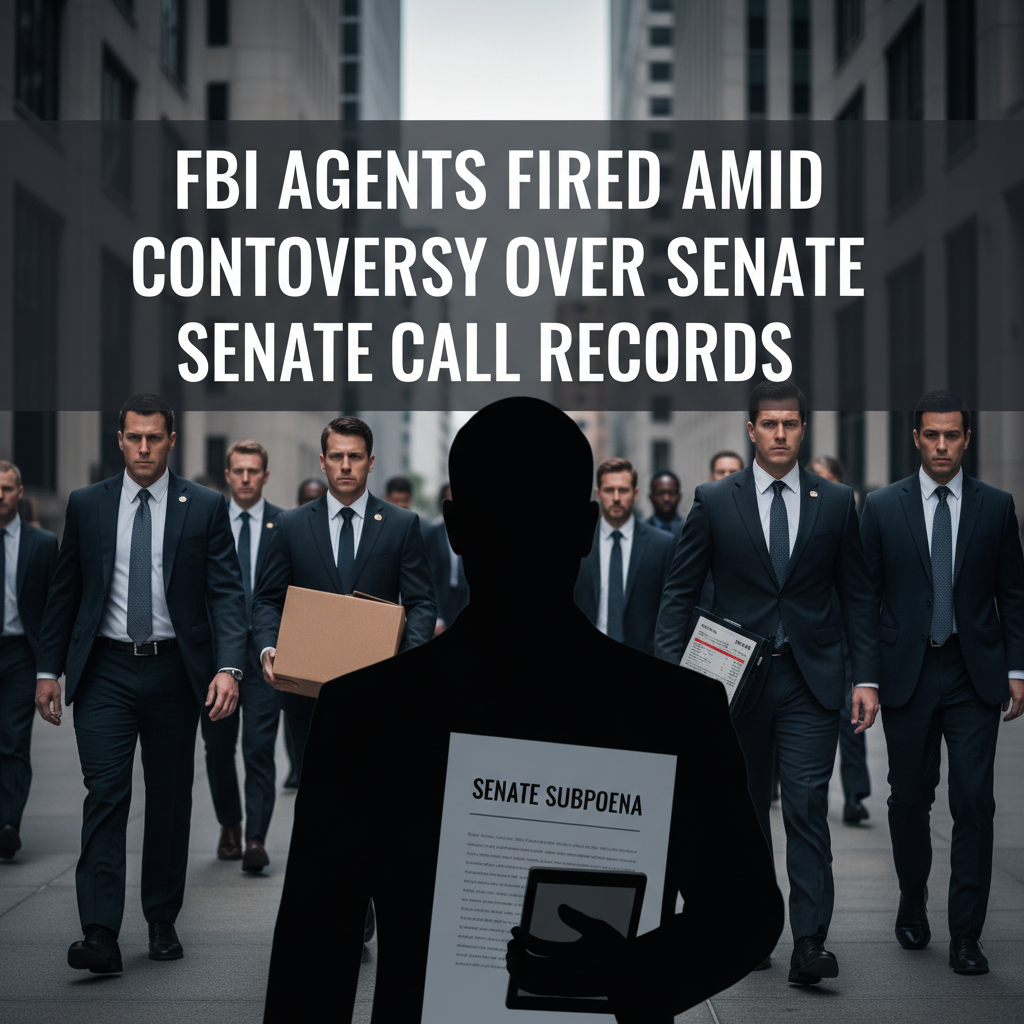FBI Agents Fired Amid Controversy Over Senate Call Records
Estimated reading time: 5 minutes
- FBI agents have been fired following access to call records of Republican senators.
- The actions were taken by former Special Counsel Jack Smith’s team amidst a political investigation.
- FBI Director Kash Patel initiated immediate reform following the controversy.
- The political implications are significant, with both sides of the aisle reacting strongly.
- The situation raises ongoing questions about transparency and accountability in federal law enforcement.
Nature of Surveillance
Administrative Response
Political Dimension
Scope and Process
Transparency and Accountability
Public and Political Fallout
Conclusion
FAQ
Nature of Surveillance
The controversy centers on actions taken by former Special Counsel Jack Smith’s team, dubbed “Arctic Frost.” Reports indicate that this group obtained toll records (essentially call metadata—not actual call content) from various Republican senators, including prominent political figures like Lindsey Graham, Marsha Blackburn, Ron Johnson, Josh Hawley, Cynthia Lummis, Bill Hagerty, Dan Sullivan, and Tommy Tuberville, as well as Rep. Mike Kelly. The records provided information about who was called, the timing, and the location of the calls, specifically during the critical week of January 6, 2021 (Fox News).
These records were obtained in 2023 through subpoenas approved by a grand jury and involved major telephone companies. The objective behind this data acquisition was to investigate the efforts to overturn the 2020 presidential election results and the related events surrounding the Capitol riot (AOL). Notably, there is confirmation that the FBI did not obtain the content of the calls, focusing exclusively on metadata (AOL).
Administrative Response
Following these revelations, FBI Director Kash Patel took decisive actions, announcing the termination of several FBI agents and the abolition of the CR-15 squad, the Washington Field Office’s public corruption unit. These drastic measures came in the wake of the internal discovery of the monitoring and were prompted by inquiries from Congress, particularly from Sen. Chuck Grassley (Fox News).
Patel described the FBI’s actions as “baseless monitoring” and assured the public of ongoing reform and accountability within the Bureau. The notification of these firings and dismantling of the unit was swift, highlighting how swiftly the FBI responded to internal and external scrutiny (National Review).
Political Dimension
The political implications of these firings cannot be understated. Occurring under new FBI leadership, these actions are interlinked with allegations that specific Federal Bureau of Investigation (FBI) and Department of Justice (DOJ) operations were politically motivated, particularly against allies of former President Donald Trump (Fox News).
Rep. Dan Bongino, the incoming Deputy Director, voiced concerns stating that the previous surveillance represented an extreme case of the FBI being “weaponized” for political purposes. He assured that such events would not take place under his leadership (Fox News). However, there are reports suggesting that the firings themselves may also be politically motivated, particularly targeting agents involved in sensitive investigations associated with Trump (CBS News via YouTube).
Scope and Process
No small number of senior officials have been impacted by this shakeup; reports indicate that between five to eight senior executives were terminated amid the ongoing restructuring of the FBI (ABC News). The entire situation is part of a broader DOJ review concerning personnel who were involved in the January 6 investigations, as well as other high-profile cases (ABC News).
Additionally, the investigation into these events reportedly concluded after former President Trump secured his 2024 presidential victory, supported by a DOJ policy stating that a sitting president cannot be prosecuted (AOL).
Transparency and Accountability
In light of the controversy and increasing public and congressional oversight, FBI leadership has emphasized their commitment to enhancing transparency and accountability (Fox News). The public and political reaction has been sharply divided, with Democrats and nonpartisan commentators expressing genuine concern over what they perceive as the politicization of federal law enforcement. In contrast, many Republicans have lauded the firings as a necessary corrective measure to a troubling situation (KPBS).
Public and Political Fallout
The ramifications of this situation extend beyond mere personnel changes; they have intensified ongoing debates regarding the alleged “weaponization” of the DOJ and FBI, allegations that have historically been utilized periodically by both parties, depending on the political climate and the unfolding events (Fox News). Congressional hearings concerning the DOJ’s conduct regarding other cases and its investigatory powers are ongoing, indicating that this issue may continue to evolve (KPBS).
Conclusion
The FBI’s decision to fire agents and dismantle the public corruption unit amid this intense scrutiny sheds light on the complexities surrounding federal investigations, particularly those involving political figures. As these events unfold, the conversation about accountability, transparency, and the politicization of law enforcement will likely remain a hot topic in American political discourse.
This situation is still developing, and the full implications of these actions are yet to be realized. Both congressional and DOJ oversight bodies continue to examine the legality and procedural justifications for the FBI’s conduct during this controversial period of American history.
For more trending news, visit NotAIWorld.com.
FAQ
Q: What triggered the firings of the FBI agents?
A: The firings were prompted by the discovery that agents had accessed call records of Republican senators during the investigations following the January 6 events.
Q: Was the content of the calls accessed?
A: No, only call metadata was obtained, such as the time, location, and participants in the calls.
Q: How has Congress reacted to this situation?
A: There has been significant scrutiny and differing opinions among Congress members, reflecting the politically charged nature of the allegations.
